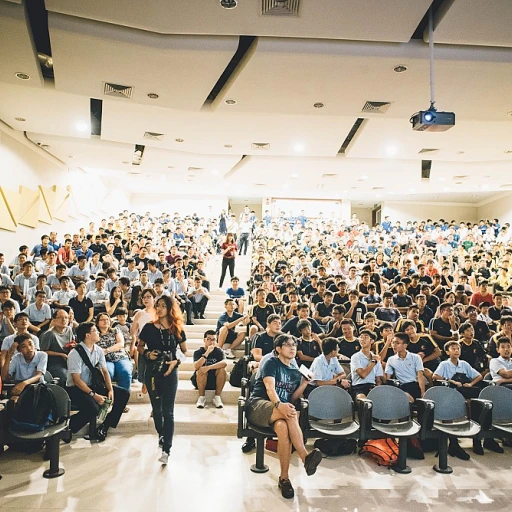
Understanding the Mentor-Mentee Relationship
Grasping the Dynamics of Mentorship
Understanding the mentor-mentee relationship is the foundation of any effective mentoring program. This unique partnership is centered around fostering professional growth, skill enhancement, and leadership development. Within this framework, both mentors and mentees engage in a journey aimed at maximizing their potential. A successful mentoring relationship relies on mutual respect and active participation from both parties. The mentor provides guidance, drawing on their professional experiences and knowledge, while the mentee actively seeks out advice, setting their own goals and objectives along the way.- Goals and Objectives: Clearly defined goals set the direction for the mentoring journey. Whether it's improving decision-making skills, developing emotional intelligence, or mastering specific leadership attributes, setting tangible objectives helps maintain focus and measure progression.
- Communication Dynamics: Effective communication is the glue that binds the mentoring relationship. Open dialogue, active listening, and transparent feedback are vital to addressing any questions or concerns that may arise during the mentorship experience.
Setting Clear Goals and Objectives
Clarifying Objectives is Fundamental to Mentoring Success
The cornerstone of an effective mentoring relationship lies in setting clear goals and objectives. This foundational step helps both mentors and mentees align their expectations and work cohesively towards professional growth. The initial discussions between mentors and mentees should focus on establishing realistic targets that can guide the mentorship throughout its duration. This ensures both parties clearly understand what they aim to achieve together.
Establishing well-defined objectives allows the mentorship experience to be productive, providing a roadmap for mentorship topics and the skills that need enhancement. From improving decision-making capabilities to fostering emotional intelligence and leadership skills, setting these aims early can help mentees with their professional development and career progression.
Keys to Aligning Goals in Mentoring Programs
- Open Dialogue: Encourage open discussions for mentees to express their aspirations and areas where they seek help. Allow mentors to share their experiences and insights to aid goal-setting.
- SMART Goals: Utilize the SMART criteria—Specific, Measurable, Achievable, Relevant, Time-bound— when defining objectives. This framework supports structured and strategic goal development.
- Flexibility: Be prepared to adapt goals as the mentoring relationship develops. Circumstances and objectives may change, necessitating adjustments to remain relevant.
Regularly revisit and refine these objectives to ensure they remain aligned with the evolving needs and aspirations of both the mentee and the mentoring program. This adaptability can fill potential gaps in the mentorship process and contribute to long-term success.
Addressing the Importance of Mutual Commitment
For this goal-oriented approach to work effectively, it is crucial to have a mutual commitment from both mentors and mentees. Establishing trust early on encourages professional growth and enables a fruitful exchange of leadership skills and experiences. This mutual trust also creates a more supportive environment for navigating any challenges that may arise during the mentoring relationship.
Ultimately, setting clear objectives in your mentoring program not only aligns with professional growth but also reinforces the importance of emotional intelligence and leadership mentoring, ensuring a comprehensive and enriching experience for all involved.
Effective Communication Strategies
Mastering Communication in Mentoring
In the realm of professional mentoring, effective communication is the backbone of a successful mentor-mentee relationship. It's not just about exchanging information; it's about understanding, empathy, and building a rapport that fosters growth and development. Here are some key strategies to enhance communication within mentoring relationships:
- Active Listening: One of the most crucial skills in mentoring is active listening. Mentors need to listen to their mentees' concerns, aspirations, and feedback without interrupting. This not only helps in understanding the mentee's perspective but also builds trust and respect.
- Open-Ended Questions: Asking open-ended questions encourages mentees to express themselves more freely. This approach helps in uncovering deeper insights into their goals and challenges, making the mentoring process more effective.
- Feedback Mechanisms: Constructive feedback is vital for professional growth. Mentors should provide feedback that is specific, actionable, and focused on improvement. Similarly, mentees should feel comfortable giving feedback to their mentors, fostering a two-way communication channel.
- Emotional Intelligence: Understanding and managing emotions play a significant role in communication. Both mentors and mentees should work on their emotional intelligence to navigate the mentoring relationship effectively, especially when discussing sensitive topics.
- Regular Check-Ins: Consistent communication through regular check-ins helps in maintaining momentum and addressing any issues promptly. This ensures that both parties are aligned with the mentoring goals and objectives.
By honing these communication strategies, mentors can better support their mentees in achieving their career and personal development goals. Effective communication not only strengthens the mentoring relationship but also contributes to the overall success of the mentoring program.
Navigating Challenges and Conflicts
Addressing Obstacles in Mentoring Dynamics
Navigating challenges and conflicts is an inevitable aspect of any mentoring relationship. While the mentor-mentee dynamic can lead to significant professional growth, both parties must be prepared to manage and address any issues that arise naturally in the process. Mentors and mentees might encounter a variety of dilemmas:- Clashing Personalities: Differences in personality and perspective can sometimes lead to misunderstandings or disagreements. Recognizing these diversities as opportunities for learning rather than barriers to collaboration is vital.
- Expectations Misalignment: At times, there can be a gap between what the mentee expects and what the mentor can realistically offer. Establishing clear goals and objectives from the start can mitigate this issue, ensuring both parties are aligned.
- Communication Barriers: Effective communication strategies, as previously outlined, are crucial. Addressing potential language, cultural, and generational differences can help in preventing miscommunication.
- Conflicting Priorities: In every mentorship, external commitments, such as demanding work schedules or personal challenges, may interrupt the mentorship's momentum. Planning in advance and maintaining flexibility can assist in balancing these priorities.
- Feedback Deficits: Constructive criticism is a cornerstone of effective mentoring. Both mentors and mentees need to cultivate an environment where feedback is not only accepted but also actively sought. Encouraging open discussions, posing questions, and seeking clarity are vital to ensure feedback is action-oriented.
Evaluating Progress and Success
Measuring Success in Mentoring Relationships
Evaluating progress and success in a mentoring relationship is crucial for both mentors and mentees. It helps in understanding whether the goals set at the beginning are being met and if the mentoring program is effective. This evaluation process is not just about ticking off completed tasks; it involves a deeper analysis of the growth and development of both parties involved.
Here are some key aspects to consider when evaluating the success of a mentoring relationship:
- Goal Achievement: Reflect on the initial goals and objectives set. Have they been achieved? If not, what adjustments are needed? This reflection helps in understanding the effectiveness of the mentoring strategies employed.
- Skill Development: Assess the skills that the mentee has developed over the course of the mentorship. This could include leadership skills, decision-making abilities, or emotional intelligence. These are crucial indicators of professional growth.
- Feedback Mechanisms: Regular feedback sessions between mentors and mentees can provide insights into the progress made. Open communication allows for adjustments in the mentoring approach and helps in addressing any challenges or conflicts that may arise.
- Long-term Impact: Consider the long-term effects of the mentoring relationship. Has it contributed to the mentee’s career advancement or personal development? For mentors, has the experience enhanced their leadership skills or provided new perspectives through reverse mentoring?
- Emotional and Professional Growth: Evaluate the emotional intelligence and professional maturity gained by the mentee. This growth is often a significant indicator of a successful mentorship experience.
By focusing on these aspects, mentors and mentees can ensure that their relationship is productive and fulfilling. It's essential to remember that success in mentoring is not just about achieving immediate goals but also about fostering a long-term relationship that benefits both parties.
Adapting to Different Mentoring Styles
Tailoring to Diverse Mentoring Approaches
In the dynamic world of professional mentoring, adapting to different mentoring styles is crucial for both mentors and mentees. A flexible approach not only enhances the mentoring relationship but also caters to the diverse needs and expectations of mentees. Each mentor comes with unique experience and skills, influencing how they guide others. Recognizing and adapting to these variations can significantly impact the success of a mentorship program. Understanding the need for different mentoring styles begins with acknowledging that no two mentoring relationships are the same. While some mentors may take a directive approach, focusing on providing specific guidance and sharing their vast knowledge, others might lean towards a non-directive style, encouraging mentees to find their own solutions. This can be particularly effective in leadership mentoring, where developing decision-making skills and emotional intelligence is essential.- Directive Mentoring: This style involves mentors who provide clear instructions and set defined goals for the mentees. It is beneficial in scenarios where mentees need help developing foundational skills or require direct support to navigate through specific topics.
- Non-Directive Mentoring: Here, mentors act as facilitators, helping mentees to explore various topics discuss at their own pace. They pose thoughtful questions that stimulate critical thinking and encourage professional growth through self-discovery.
- Reverse Mentoring: An innovative concept, reverse mentoring allows younger or less experienced individuals to mentor their senior peers. This approach can fill knowledge gaps related to contemporary skills like technology, helping leaders stay updated with modern trends.













